

Create Room are a unique construction company specialising in Loft Conversions, Garden Rooms, Property Extensions and Garage Conversions.
How Much Does a Garage Conversion Cost? - Create Room. A garage conversion can provide you with a brand new room with which you can do whatever you want.
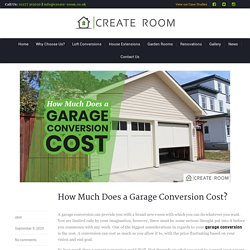
You are limited only by your imagination, however, there must be some serious thought put into it before you commence with any work. Bungalow Loft Conversion Ideas to try in 2020 - PAT Testing. A loft conversion is one of the current trending ideas since it not only adds more space but also increases the value of the home.
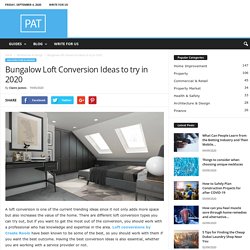
There are different loft conversion types you can try out, but if you want to get the most out of the conversion, you should work with a professional who has knowledge and expertise in the area. Loft conversions by Create Room have been known to be some of the best, so you should work with them if you want the best outcome. Having the best conversion ideas is also essential, whether you are working with a service provider or not. Consider all the factors Before starting the conversion, you have to consider all the factors that will affect the process. Include furniture in your design When picturing the layout, you must include the furniture set up. Allow enough daylight. 5 IDEAL THINGS TO CONSIDER BEFORE STARTING YOUR LOFT CONVERSION - Ideal Magazine. Though loft conversions can add space, character and charm to a house, let’s be honest for a moment; they can also be hugely problematic.

Although they represent a cost-effective and relatively easy home improvement project, they are also one of the most likely undertakings to go wrong. Yep, mistakes do happen and can affect the outcome of the project, financially and in the build. Space, design and location of the property are all factors that affect conversion suitability. With that in mind, here are 5 IDEAL things to consider before starting your loft conversion. Knowing the type of loft you want, intimately and in great detail, is the first crucial step to measuring the feasibility of the conversion. No loft design is unique. One way to avoid getting entangled in unrealistic expectations is by hiring an architectural expert to advise you from the planning stage. Whether or not you can convert your loft sometimes depends firstly, on its size of course. Some of the issues here include:
Loft Conversions Chingford. Loft Conversions are one of the most popular ways homeowners use to expand on unused loft space, transforming it into extra space for their homes.
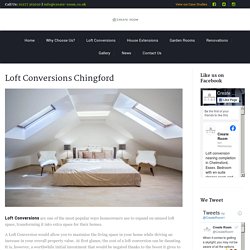
A Loft Conversion would allow you to maximise the living space in your home while driving an increase in your overall property value. At first glance, the cost of a loft conversion can be daunting. It is, however, a worthwhile initial investment that would be negated thanks to the boost it gives to the price of your home. Extension Builders Essex. Extending your home with a single storey extension as opposed to moving to a new house can prove to be a more economic and satisfactory solution that suits your family’s present and future needs.

A new extension is a sensible investment that can add to the value of your home and provide the additional internal space required enabling you to make the most effective use of your accommodation. Many more people are now considering extending their properties as an alternative to moving home, as the costs of buying and selling property are so prohibitive. However, this significant investment can prove to be very daunting without the professional advice to help you make the right choices.
Loft Conversions Southend - Loft Extension Experts Southend. Building Regulation Approval All loft conversions need Building Regulation Approval.
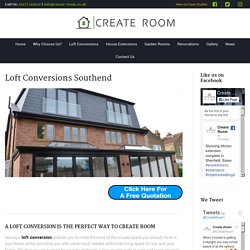
Either you’re Local Authority or an Independent Building Control Company would be appointed. Full plans and structural calculations will be submitted to the chosen Building Control authority. These, in turn with onsite, visual inspections will ensure that the proposed design and work is sufficient to meet their requirements. Loft Conversions Chingford. Loft Conversion Specialists Essex. Loft Conversion Specialists Essex. Design Ideas and Expert Advice. One of the best contemporary additions to a garden today is to use a garden room.
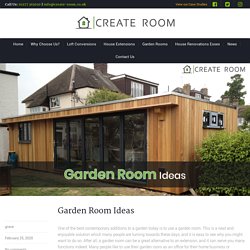
This is a neat and enjoyable solution which many people are turning towards these days, and it is easy to see why you might want to do so. After all, a garden room can be a great alternative to an extension, and it can serve you many functions indeed. Many people like to use their garden room as an office for their home business or freelance work, while others merely use it as a kind of alternative living room.
Dormer Loft Conversion Cost in 2020. Dormer loft conversions are a tool that many homeowners like to use to extend the amount of available space in their property.
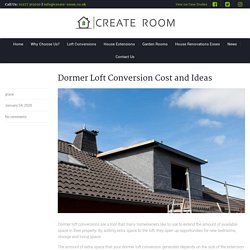
By adding extra space to the loft, they open up opportunities for new bedrooms, storage and living space. The amount of extra space that your dormer loft conversion generates depends on the size of the extension that you plan. A large, double dormer loft conversion, for example, can yield 50 cubic metres of space in your loft, opening up numerous possibilities for additional living space and storage. Loft Conversion Ideas for Small Lofts - Create Room. Extension Builders Essex.
Loft Conversions Essex & London. Building Regulation Approval All loft conversions need Building Regulation Approval.
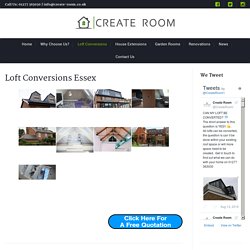
Either you’re Local Authority or an Independent Building Control Company would be appointed. Full plans and structural calculations will be submitted to the chosen Building Control authority. These, in turn with onsite, visual inspections will ensure that the proposed design and work is sufficient to meet their requirements. Once they are satisfied that your loft conversion meets the set Building Control Regulations, a completion letter will be forwarded to you. Permitted Development Allowance A loft conversion for your house is considered to be permitted development, not requiring an application for planning permission. The permitted development allowances described here apply to houses and bungalows, not flats, maisonettes or other buildings.